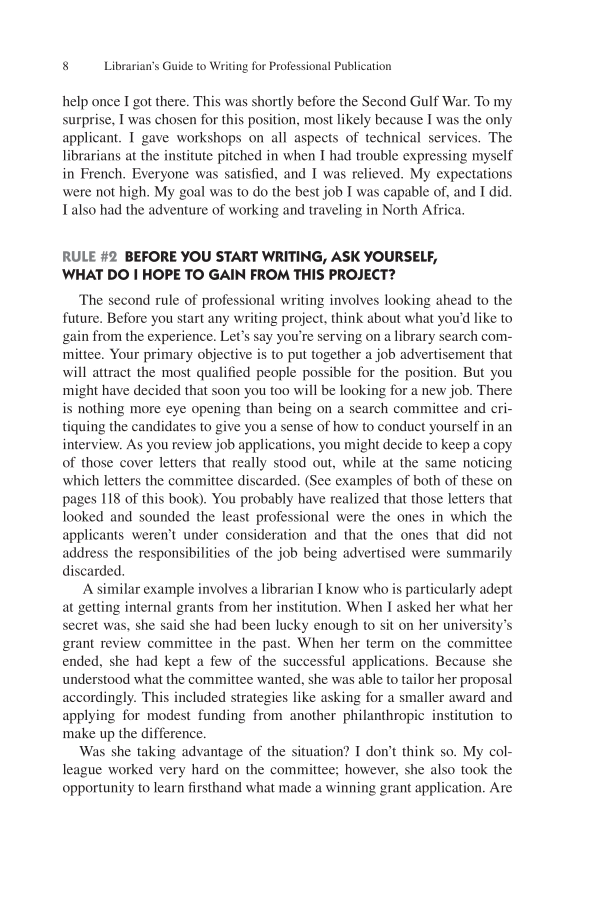8 Librarian’s Guide to Writing for Professional Publication help once I got there. This was shortly before the Second Gulf War. To my surprise, I was chosen for this position, most likely because I was the only applicant. I gave workshops on all aspects of technical services. The librarians at the institute pitched in when I had trouble expressing myself in French. Everyone was satisfied, and I was relieved. My expectations were not high. My goal was to do the best job I was capable of, and I did. I also had the adventure of working and traveling in North Africa. RULE #2 BEFORE YOU START WRITING, ASK YOURSELF, WHAT DO I HOPE TO GAIN FROM THIS PROJECT? The second rule of professional writing involves looking ahead to the future. Before you start any writing project, think about what you’d like to gain from the experience. Let’s say you’re serving on a library search com- mittee. Your primary objective is to put together a job advertisement that will attract the most qualified people possible for the position. But you might have decided that soon you too will be looking for a new job. There is nothing more eye opening than being on a search committee and cri- tiquing the candidates to give you a sense of how to conduct yourself in an interview. As you review job applications, you might decide to keep a copy of those cover letters that really stood out, while at the same noticing which letters the committee discarded. (See examples of both of these on pages 118 of this book). You probably have realized that those letters that looked and sounded the least professional were the ones in which the applicants weren’t under consideration and that the ones that did not address the responsibilities of the job being advertised were summarily discarded. A similar example involves a librarian I know who is particularly adept at getting internal grants from her institution. When I asked her what her secret was, she said she had been lucky enough to sit on her university’s grant review committee in the past. When her term on the committee ended, she had kept a few of the successful applications. Because she understood what the committee wanted, she was able to tailor her proposal accordingly. This included strategies like asking for a smaller award and applying for modest funding from another philanthropic institution to make up the difference. Was she taking advantage of the situation? I don’t think so. My col- league worked very hard on the committee however, she also took the opportunity to learn firsthand what made a winning grant application. Are
Document Details My Account Print multiple pages
Print
You have printed 0 times in the last 24 hours.
Your print count will reset on at .
You may print 0 more time(s) before then.
You may print a maximum of 0 pages at a time.
















































































































































































